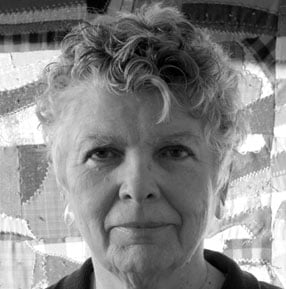Red String
At first she thought the lump in the road
was clay thrown up by a trucker's wheel.
Then Beatrice saw the mess of feathers.
Six or seven geese stood in the right-of-way, staring
at the blood, their black heads rigid above white throats.
Unmoved by passing wind or familiar violence, they fixed
their gaze on dead flesh and something more, a bird on the wing.
It whirled in a thicket of fog that grew up from fields plowed
and turned to winter. It joined other spirits exhaled before dawn,
creatures that once had crept or flapped or crawled over the land.
Beatrice had heard her mother tell of men who passed
as spirits. They hid in limestone caves by the river, hooded
themselves inside the curved wall, the glistening rock.
Then just at dark they appeared, as if they had the power
to split the earth open to release them. White-robed, faceless
horned heads, they advanced with torches over the water,
saying, We are the ghosts of Shiloh and Bull Run fight!
Neighbors who watched at the bridge knew each man by his voice
or limp or mended boots but said nothing, let the marchers
pass on. Then they ran their skinny hounds to hunt other
lives down ravines, to save their skins another night
from the carrion beetles, spotted with red darker than blood,
who wait by the grave for the body's return to the earth.
Some years the men killed scores, treed them in the sweetgums,
watched a beast face flicker in the starry green leaves.
Then they burned the tree.
Smoke from their fires
still lay over the land where Beatrice travelled.
Out of this cloud the dead of the field spoke to her,
voices from a place where women's voices never stop:
They took my boy down by Sucarnochee creek.
He said, "Gentlemen, what have I done?"
They says, "Never mind what you have done.
We just want your damned heart." After they
killed him, I built up a little fire and laid out
by him all night until the neighbors came
in the morning. I was standing there when
they killed him, down by Sucarnochee creek.
I am a mighty brave woman, but I was getting
scared the way they were treating me, throwing rocks
on my house, coming in disguise. They come to my bed
where I was laying, and whipped me. They dragged me
out into the field so that the blood strung across
the house, and the fence, and the cotton patch,
in the road, and they ravished me. Then they went
back into my house and ate the food on the stove.
They have drove me from my home. It is over
by DeSotoville, on the other side in Choctaw.
I had informed of persons whom I saw
dressing in Ku-Klux disguise;
had named the parties. At the time
I was divorced from Dr. Randall
and had a school near Fredonia.
About one month before the election
some young men about the county
came in the night-time; they said
I was not a decent woman; also
I was teaching radical politics.
They whipped me with hickory withes.
The gashes cut through my thin dress,
through the abdominal wall.
I was thrown into a ravine
in a helpless condition. The school
closed after my death.
From the fog above the bloody entrails of the bird, the dead flew
toward Beatrice like the night crow whose one wing rests on the evening
while the other dusts off the morning star. They gave her such a look:
Child, what have you been up to while we
were trying to keep body and soul together?
But never mind that now. Here's what you must do:
Tie a red flannel string around your waist.
Plant your roots when the moon is dark. Remember
your past, and ours. Always remember who you are.
Don't let those men fool you about the ways of life
even if blood must sign your name.
Credit
From Walking Back Up Depot Street, copyright © 1999 by Minnie Bruce Pratt. Reprinted by permission of the author. All rights reserved.
Date Published
01/01/1999

